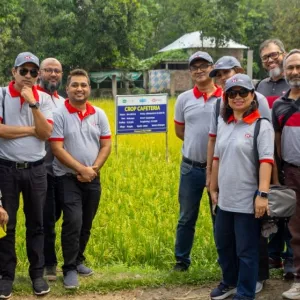IRRI showcases improved rice varieties and training farmers on climate-smart agriculture during Farmers’ Field Day in the Haor Region
IRRI and partners empower haor farmers with climate-smart innovations to improve productivity, resilience, and livelihoods in rice farming. Nikli, Kishoreganj (22 April 2025) – Bangladesh’s haor region, responsible for 25% of the country’s boro rice and 15% of annual rice production, is increasingly vulnerable to climate shocks, old technologies and practices, and systemic gaps in the rice value chain.

IRRI showcases improved rice varieties and training farmers on climate-smart agriculture during Farmers’ Field Day in the Haor Region

IRRI and partners empower haor farmers with climate-smart innovations to improve productivity, resilience, and livelihoods in rice farming.
Nikli, Kishoreganj (22 April 2025) – Bangladesh’s haor region, responsible for 25% of the country’s boro rice and 15% of annual rice production, is increasingly vulnerable to climate shocks, old technologies and practices, and systemic gaps in the rice value chain.
The Climate-Smart Rice Value Chain (CS-RVC) Project, led by the International Rice Research Institute (IRRI) and through HSBC’s philanthropic support , addresses these challenges by introducing innovative, scalable solutions tailored to the haor context and challenges. Friends in Village Development Bangladesh (FIVDB), a local NGO, is implementing the project on the ground.
To showcase these interventions, IRRI organized a Farmers’ Field Day in Pachrukhi, Nikli, Kishoreganj on 22 April 2025, gathering over 150 farmers and more than 40 researchers, government officials, millers, private sector officials, and other stakeholders. Participants firsthand observed and explored field-tested technologies and practices to build a more resilient, sustainable rice economy in the region.
Haor region’s agricultural contribution
“Bangladesh’s food security depends heavily on the haor region’s boro rice production, yet the farmers here are the most exposed to climate and market shocks,” said Dr. Humnath Bhandari, Country Representative, IRRI. “We’re co-developing and scaling solutions with farmers to align research, community input, and institutional support for a truly resilient rice value chain.”
Dr. Md. Rafiqul Islam, Director (Research), BRRI, added, “Haor is a highly productive area. It impacts the country’s food supply significantly. We must collectively explore solutions with other organizations and farmers to strengthen irrigation, improve seed systems, and scale agricultural mechanization.”
Building on the call for integrated action across the sector,…

